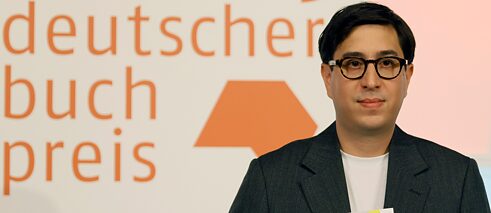German Book Prize 2023
Coming-of-age novel about a gamer

Awarding the German Book Prize to Tonio Schachinger is a very good decision. His novel “Echtzeitalter” is narratively mature, entertaining and full of esprit. A commentary.
Tonio Schachinger’s novel Echtzeitalter has been awarded the German Book Prize, but it is not only the young 31-year-old writer who deserves to be congratulated – the jury does, too. It has paid tribute to a work that ultimately cares little about the zeitgeist, yet is narratively mature, entertaining and exquisitely humorous. Schachinger’s wit encompasses not only keen observation and esprit, but also thoughtful paradox.
The pubescent hero of this nearly 400-page coming-of-age novel is named Till. He attends the Marianum, an elite Austrian boarding school that still has teachers who are splendidly despotic and somewhat old-fashioned creatures. German literature is taught by Dolinar, who takes sadistic pleasure in spreading fear and terror and inflicts draconian punishments to incite his charges to read the classics. His educational credo: “Nothing from the twentieth century, no translations, and nothing that isn’t available in a Reclam edition.”
Caricature of authority
Trotting out the familiar old conflict between pupils (interested in the chaos of first love but above all in computer games) and their reactionary teachers may appear somewhat hackneyed at first glance, yet it does serve a purpose: precisely by depicting a caricature of authority, Schachinger is celebrating his literary Bildungsroman predecessors. Admittedly, probably nothing could have less to do with the gamer Till, with his penchant for Age of Empires, than Adalbert Stifter’s Indian Summer. Schachinger however is fully aware that his novel, with its nods to the past, enrols him in a tradition of bourgeois literature.For adolescents, computer games offer the same place of retreat that literature once did, yet at its glowing core Echtzeitalter is about good old-fashioned emotional education: about ordeals such as a confrontation with a dying father; about one’s first agonizingly bitter-sweet love that one somehow has to get to grips with; about a relationship with a mother that is fraught with sad but funny misunderstandings. The boy grows up into a world of adults that he still regards as alien, but he is learning all the time: “Everyone has to take a holiday sooner or later, all cats get an eye infection sooner or later, and everyone apparently sleeps with their work colleague sooner or later.” Perhaps the biggest surprise is that the novel ends optimistically, as this somewhat contradicts the expectations we have of contemporary literature, which after all seeks so frequently to be as crass and somehow genuine as possible, yet it corresponds entirely to the genre that Schachinger is bringing back to life.
In the spring I met the author in Vienna to write a portrait of him for the ZEIT literary magazine. We talked a little about humour, which I suggested in the German-speaking world was most commonly to be found in Austria, and Schachinger very cheerfully agreed: “In Austria there are of course some incredibly funny people, yet all of them are incompetent.” If that were true, Tonio Schachinger would be the big exception.
Hamburg: Rowohlt, 2023. 368 p.
ISBN: 978-3-498-00317-3
You can find this title in our eLibrary Onleihe.
